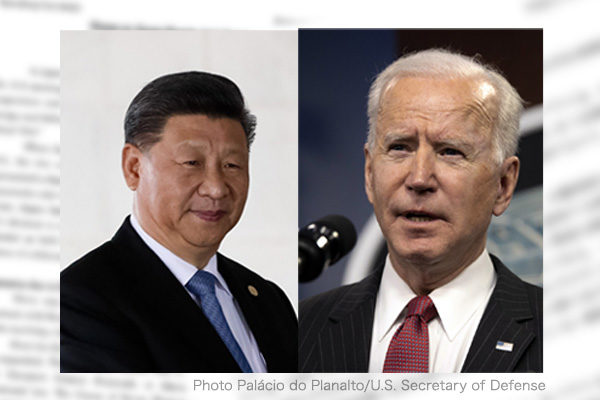U.S. President Joseph Biden held his first telephone talks with Chinese President Xi Jinping last week. The White House said Biden conveyed his concerns about Beijing’s crackdown in Hong Kong, human rights abuse in Xinjiang, military pressure on Taiwan, and unfair economic practices. The Chinese official announcement stressed Xi urged Biden to reestablish dialogue mechanisms between the two countries.
Biden had been well expected to first indicate a firm attitude towards China in consideration of his relations with the Congress known for taking a bipartisan hard line on China. Until seeing specific actions, however, one cannot decide whether Biden really is firm. Rather, his hardline attitude could end up as empty rhetoric.
Remember a nightmare in the second half of the Obama administration. While advocating a pivot to Asia, it cut defense spending and could take no effective measures against China’s artificial island construction in the South China Sea. The Asia rebalancing policy failed to be accompanied by specific actions. The Biden administration that includes many former Obama officials may have the previous administration’s “rhetoric only” DNA.
Biden feared to cut defense spending
Two potential actions by the Biden administration are viewed as matters of concern regarding its attitude on China.
The first is a potential cut in defense spending at a time when the United States’ military balance with China is extremely important due to rapid growth in China’s military capabilities. Giving priority to domestic issues, the Biden administration is likely to seek financial resources for novel coronavirus countermeasures and a large economic stimulus package while cutting defense budget. Given that Michele Flournoy has been dropped as the most promising candidate for the defense secretary, leftists’ influence within the Democratic Party cannot be ignored.
The second is a potential setback in law enforcement against China by the Federal Bureau of Investigation and the Departments of State and Commerce. Congress has legislated tough measures on China over technological dominance attempt and human rights abuse, but these legislations must be accompanied by law enforcement to produce real effects. Under the Trump administration, the FBI focused its resources on China-related measures, the State Department promoted its networks with reliable U.S. allies, and the Commerce Department tried to close loopholes in sanctions on Chinese telecommunications giant Huawei through export control operation. It is uncertain if the Biden administration would spend enough energy on such law enforcement.
Beijing changing the status quo steadily
The Biden administration has created a China task force in the Defense Department to formulate a specific China policy within four months. This means that it may take no major actions on China and maintain the status quo over that period. Ahead of the foreign policy and national security team, a climate change team will explore cooperation with Beijing toward a planned climate leaders’ summit in April. Beijing may try to take advantage of such approach by the Biden administration.
Beijing leaves the Biden administration to step up rhetorical criticism against China, rebuts such criticism by stereotypically saying that it is interference with domestic affairs, and, at the same time, shakes Washington by demonstrating its positive attitude towards dialogue. Meanwhile, Beijing steadily accumulates actions including incursions into Taiwan’s air defense identification zone, intrusions into Japan’s territorial waters around the Senkaku Islands, and the enforcement of the new coast guard law. It also diligently attempts to woo other countries with the so-called vaccine diplomacy.
China’s intention is to accumulate actions for changing the status quo before the Biden administration’s strong rhetoric is accompanied by actions. We should have a greater sense of crisis on such situation.
Masahiko Hosokawa is a professor at Meisei University and a former director-general of the Trade Control Department at Japan’s Ministry of Economy, Trade and Industry. He is also a Planning Committee member at the Japan Institute for National Fundamentals.


